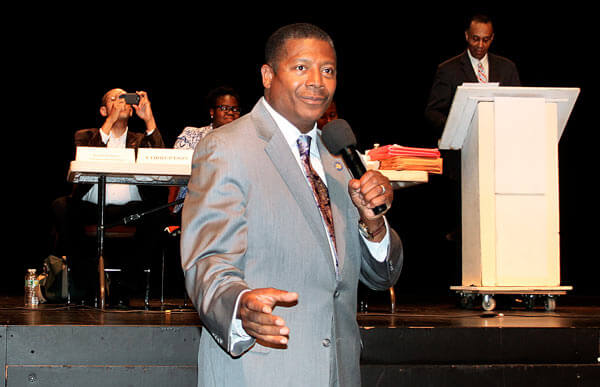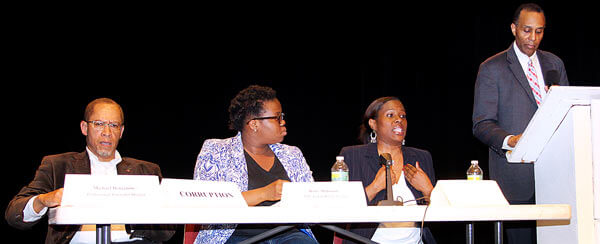By Rich Bockmann
They’re neither judge nor jury, but if they were, they’d lock ’em up.
Days after the revelation that former state Sen. Shirley Huntley secretly recorded some of her fellow politicians launched a new wave of headlines, a crowd in St. Albans voted on a debate about whether corruption or conspiracy played a role in the focus on black leaders — and the outcome was not favorable to elected officials.
“We have 24 hands for conspiracy and 27 hands for corruption,” Tameek Hogan, a staffer in the office of Sen. James Sanders (D-Jamaica) announced to applause late Friday night at the Black Spectrum Theatre.
Sanders, who defeated Huntley in her Senate re-election bid after she was charged with covering up an embezzlement scam last year, scheduled the debate in-between the time Sen. Malcolm Smith (D-Jamaica) was charged in a bribery plot and Sen. John Sampson (D-Brooklyn) — whom Huntley recorded along with Smith, Sen. Peralta (D-East Elmhurst) and City Councilman Ruben Wills (D-Jamaica) — was charged with stealing more than $400,000 to fund a failed bid for district attorney.
In deference to those who had yet to have their day in court, Sanders set a ground rule that the debaters were not to mention any southeast Queens politician by name, and said the event was not a “cut-up job” of any elected official.
“We are in the midst of seeing an unprecedented attack of one type or another. We have to figure out what is the nature of this attack,” he said. “Is it corruption has overtaken the whole district — the whole area — and it needs to be rooted out? Or is it there’s a conspiracy, and if that’s the case, we need to look it in the eye and deal with it straightforward.”
The conspiracy team likened the recent scandals to a “political stop-and-frisk,” arguing white leaders can get away with things minority leaders cannot.
“We have 28 [senators] that are Democratic, 14 of which are minorities, 10 of which have had their names linked to allegations,” said debater Paul Nichols. “I’m glad to see [the others are] completely pure and pristine.”
Nichols disclosed at the beginning of the debate that he is Sanders’ chief of staff and was expressing his own opinions.
On the corruption side, Terry De Mendonca, founder of a nonprofit that helps youths with criminal records, argued that race should not be an issue.
“We all know that racism is present; that’s neither here nor there. My question is, ‘When does the African-American community start to take responsibility for their actions?’” she asked. “If you do something wrong, you’re corrupt. Because you got caught doesn’t make it a conspiracy.”
Richard Washington, an attorney and former prosecutor, pointed out that the accused were innocent until proven guilty.
“A lot of the people who have been the topic of this entire debate, that means as we sit here right now, they’re innocent,” he said. “You can indict a ham sandwich.”
“The fact that it’s already presumed that they are [guilty] just shows you the strength and the power of the conspiracy that we’ve been talking about,” Washington added.
For his part, Sanders said he thought the truth lay somewhere in the middle of both sides, pointing out it is up to informed voters to stem corruption.
“You can’t hold a person responsible if you don’t know what they’re supposed to be doing,” he said.
Reach reporter Rich Bockmann by e-mail at rbockmann@cnglocal.com or by phone at 718-260-4574.




































